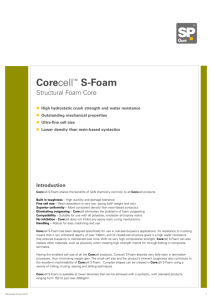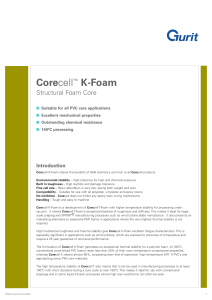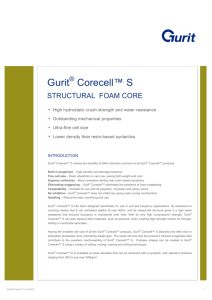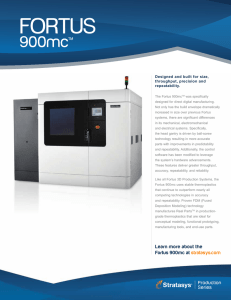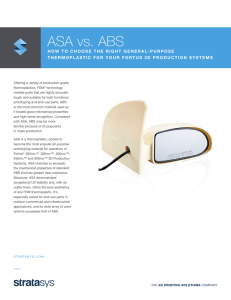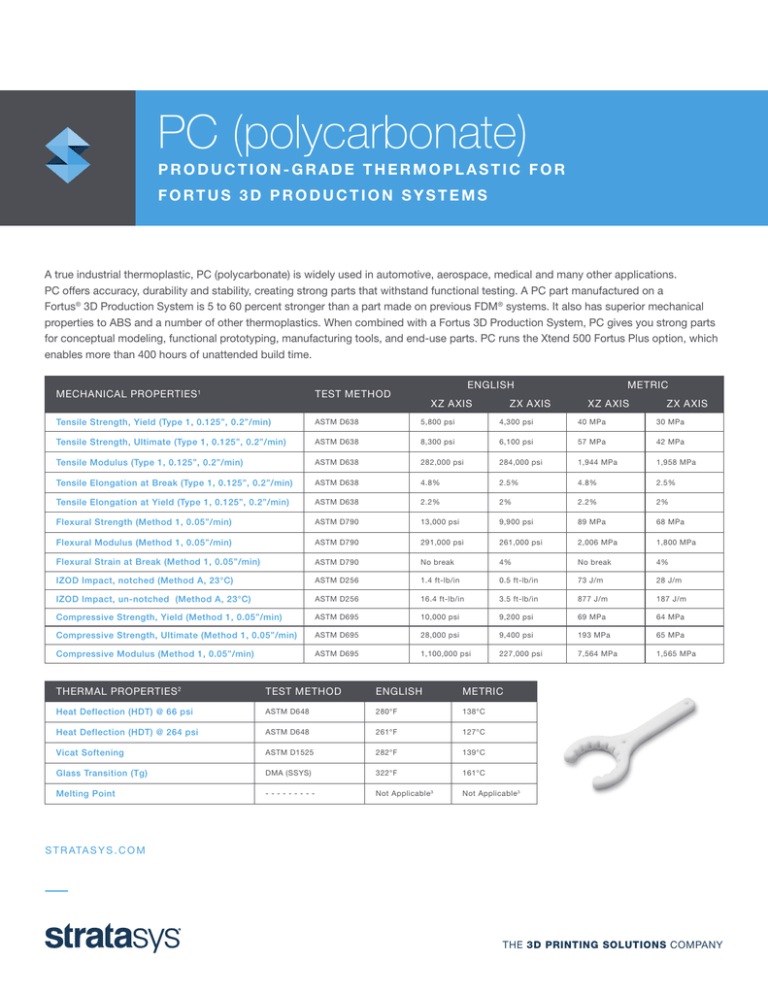
PC (polycarbonate)
PRODUCTION-GRADE THERMOPLASTIC FOR
FORTUS 3D PRODUCTION SYSTEMS
A true industrial thermoplastic, PC (polycarbonate) is widely used in automotive, aerospace, medical and many other applications.
PC offers accuracy, durability and stability, creating strong parts that withstand functional testing. A PC part manufactured on a
Fortus® 3D Production System is 5 to 60 percent stronger than a part made on previous FDM® systems. It also has superior mechanical
properties to ABS and a number of other thermoplastics. When combined with a Fortus 3D Production System, PC gives you strong parts
for conceptual modeling, functional prototyping, manufacturing tools, and end-use parts. PC runs the Xtend 500 Fortus Plus option, which
enables more than 400 hours of unattended build time.
ENGLISH
METRIC
MECHANICAL PROPERTIES1
TEST METHOD
Tensile Strength, Yield (Type 1, 0.125”, 0.2”/min)
ASTM D638
5,800 psi
4,300 psi
40 MPa
30 MPa
Tensile Strength, Ultimate (Type 1, 0.125”, 0.2”/min)
ASTM D638
8,300 psi
6,100 psi
57 MPa
42 MPa
Tensile Modulus (Type 1, 0.125”, 0.2”/min)
ASTM D638
282,000 psi
284,000 psi
1,944 MPa
1,958 MPa
Tensile Elongation at Break (Type 1, 0.125”, 0.2”/min)
ASTM D638
4.8%
2.5%
4.8%
2.5%
Tensile Elongation at Yield (Type 1, 0.125”, 0.2”/min)
ASTM D638
2.2%
2%
2.2%
2%
Flexural Strength (Method 1, 0.05”/min)
ASTM D790
13,000 psi
9,900 psi
89 MPa
68 MPa
Flexural Modulus (Method 1, 0.05”/min)
ASTM D790
291,000 psi
261,000 psi
2,006 MPa
1,800 MPa
Flexural Strain at Break (Method 1, 0.05”/min)
ASTM D790
No break
4%
No break
4%
IZOD Impact, notched (Method A, 23°C)
ASTM D256
1.4 ft-lb/in
0.5 ft-lb/in
73 J/m
28 J/m
IZOD Impact, un-notched (Method A, 23°C)
ASTM D256
16.4 ft-lb/in
3.5 ft-lb/in
877 J/m
187 J/m
Compressive Strength, Yield (Method 1, 0.05”/min)
ASTM D695
10,000 psi
9,200 psi
69 MPa
64 MPa
Compressive Strength, Ultimate (Method 1, 0.05”/min)
ASTM D695
28,000 psi
9,400 psi
193 MPa
65 MPa
Compressive Modulus (Method 1, 0.05”/min)
ASTM D695
1,100,000 psi
227,000 psi
7,564 MPa
1,565 MPa
XZ A XIS
ZX A XIS
THERMAL PROPERTIES 2
TEST METHOD
ENGLISH
METRIC
Heat Deflection (HDT) @ 66 psi
ASTM D648
280°F
138°C
Heat Deflection (HDT) @ 264 psi
ASTM D648
261°F
127°C
Vicat Softening
ASTM D1525
282°F
139°C
Glass Transition (Tg)
DMA (SSYS)
322°F
161°C
Melting Point
---------
Not Applicable 3
Not Applicable 3
XZ A XIS
ZX A XIS
S T R ATA S Y S . C O M
THE 3D PRINTING SOLUTIONS COMPANY
PC (polycarbonate)
PRODUCTION-GRADE THERMOPLASTIC FOR
FORTUS 3D PRODUCTION SYSTEMS
At the core:
Advanced FDM Technology
Fortus systems are based on
FDM (fused deposition modeling)
technology. FDM is the industry’s
leading additive manufacturing
technology, and the only one that uses
production-grade thermoplastics,
enabling the most durable parts.
Fortus systems use a wide range
of thermoplastics with advanced
mechanical properties so your
parts can endure high heat, caustic
chemicals, sterilization and highimpact applications.
No special facilities needed
You can install a Fortus 3D Production
System just about anywhere. No special
venting is required because Fortus
systems don’t produce noxious fumes,
chemicals or waste.
No special skills needed
Fortus 3D Production Systems
are easy to operate and maintain
compared to other additive fabrication
systems because there are no messy
powders to handle and contain.
They’re so simple, an operator can be
trained to operate a Fortus system in
less than 30 minutes.
Get your benchmark on the
future of manufacturing
Fine details. Smooth surface finishes.
Accuracy. Strength. The best way to
see the advantages of a Fortus 3D
Production System is to have your own
part built on a Fortus system. Get your
free part at: stratasys.com.
ELECTRICAL PROPERTIES 4
TEST METHOD
VALUE RANGE
Volume Resistivity
ASTM D257
6.0x1013 - 2.0x1014 ohm-cm
Dielectric Constant
ASTM D150-98
2.8 - 3.0
Dissipation Factor
ASTM D150-98
.0005 - .0006
Dielectric Strength
ASTM D149-09, Method A
80 - 360 V/mil
OTHER 2
TEST METHOD
VALUE
Specific Gravity
ASTM D792
1.2
Flame Classification
UL94
HB
Coefficient of Thermal Expansion
ASTM E831
3.8x10 -05 in/in/°F
Rockwell Hardness
ASTM D785
R115
UL File Number
---------
E345258
SYSTEM AVAILABILITY
LAYER THICKNESS
CAPABILITY
SUPPORT
STRUCTURE
Fortus 360mc™
0.013 inch (0.330 mm)
Breakaway,
Fortus 380mc™ Fortus
0.010 inch (0.254 mm)
Soluble
400mc™
AVAIL ABLE
COLORS
White
0.007 inch (0.178 mm)
Fortus 450mc™
0.005 inch (0.127 mm)5
Fortus 900mc™
The information presented are typical values intended for reference and comparison purposes only. They should not be used for design
specifications or quality control purposes. End-use material performance can be impacted (+/-) by, but not limited to, part design, end-use
conditions, test conditions, etc. Actual values will vary with build conditions. Tested parts were built on Fortus 400mc @ 0.010” (0.254 mm)
slice. Product specifications are subject to change without notice.
The performance characteristics of these materials may vary according to application, operating conditions, or end use. Each user is
responsible for determining that the Stratasys material is safe, lawful, and technically suitable for the intended application, as well as for
identifying the proper disposal (or recycling) method consistent with applicable environmental laws and regulations. Stratasys makes no
warranties of any kind, express or implied, including, but not limited to, the warranties of merchantability, fitness for a particular use, or
warranty against patent infringement.
1
Build orientation is on side long edge.
2
Literature value unless otherwise noted.
3
Due to amorphous nature, material does not display a melting point.
All Electrical Property values were generated from the average of test plaques built with default part density (solid). Test plaques were
4.0 x 4.0 x 0.1 inches (102 x 102 x 2.5 mm) and were built both in the flat and vertical orientation. The range of values is mostly the result of
the difference in properties of test plaques built in the flat vs. vertical orientation.
4
PC can attain 0.005 inch (0.127mm) layer thickness when used with SR-100 soluble support. 0.005 inch layer thickness is not available on
the Fortus 900mc.
5
Orientation: See Stratasys Testing white paper for more detailed description of build orien tations.
XZ = X or “on edge”
Upright (ZX)
On-Edge (XZ)
XY = Y or “flat”
Y
ZX = or “upright”
Flat (XY)
Z
X
HEADQUARTERS
E info@stratasys.com / STRATASYS.COM
ISO 9001:2008 Certified
7665 Commerce Way, Eden Prairie, MN 55344
+1 888 480-3548 (US Toll Free)
+1 952 937-3000 (Intl)
+1 952 937-0070 (Fax)
2 Holtzman St., Science Park, PO Box 2496
Rehovot 76124, Israel
+972 74 745-4000
+972 74 745-5000 (Fax)
©2015 Stratasys Inc. All rights reserved. Stratasys, FDM, Fortus and Finishing Touch are registered trademarks of Stratasys Inc. FDM Technology, Fused Deposition Modeling, Fortus 250mc, Fortus 360mc, Fortus 400mc, Fortus
450mc, Fortus 900mc, Insight, Control Center, FDM Team, Smart Supports, SR-30, SR-100, ABSplus, ABS-ESD7, ABSi and TouchWorks are trademarks of Stratasys, Inc. *ULTEM is a trademark of SABIC Innovative Plastics IP
BV. All other trademarks are the property of their respective owners, and Stratasys assumes no responsibility with regard to the selection, performance, or use of these non-Stratasys products. Product specifications subject to
change without notice. Printed in the USA. MSS_FDM_PC_EN_0815

